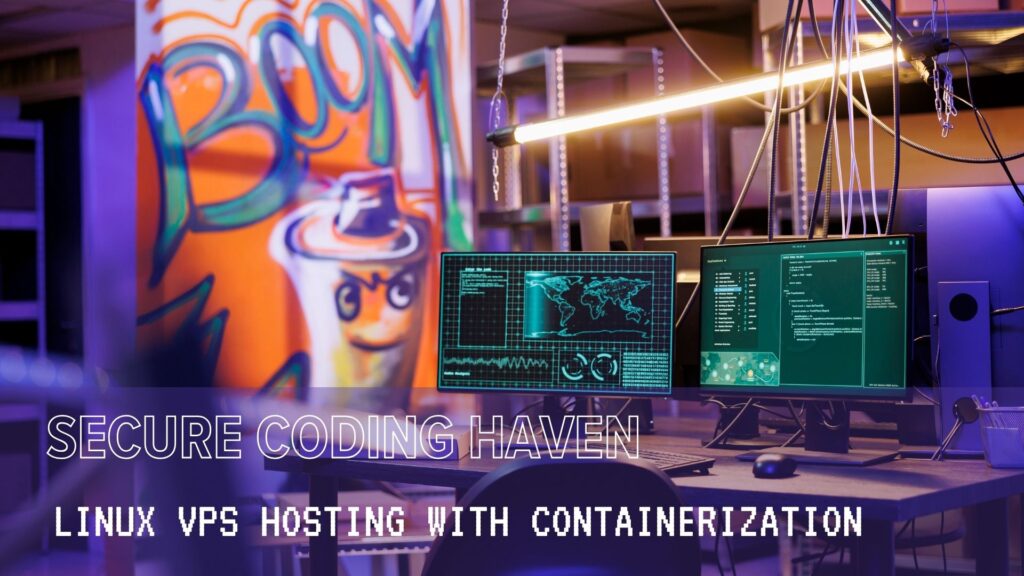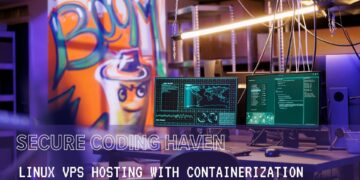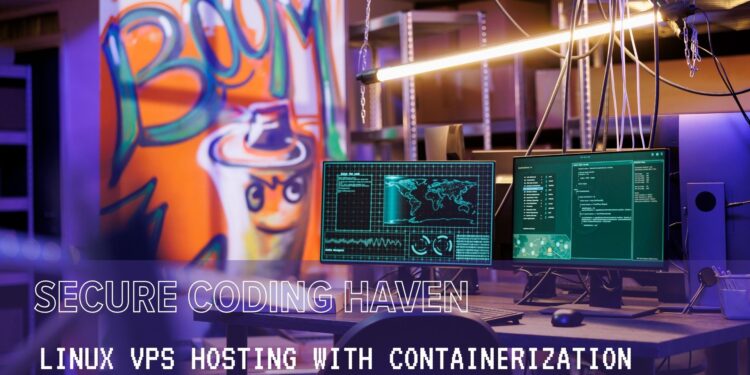Security plays an important role in the constantly changing field of software development. Data breaches, vulnerabilities, and the spectre of cyber threats are continuous concerns for developers. As we embark on a journey to fortify the bastions of code, Linux VPS hosting emerges as a formidable ally, offering robust security features. This blog post unveils the realm of Linux VPS hosting with a focus on containerization, a powerful strategy to secure every line of code and safeguard every client.
What is Containerization?
Containerization is the magician’s wand of the software world, bringing unparalleled simplicity and security to the development process. Picture it as a digital lunchbox, neatly packaging applications and their dependencies. This not only ensures isolation but also facilitates efficient resource management and seamless portability. Now, let’s compare this modern marvel with its predecessor, traditional virtualization methods.
Unlike the heavyweight VMs, containers share the host OS kernel, making them lightweight, nimble, and perfect for rapid deployment. Docker and Kubernetes, the superheroes of containerization, lead the pack, orchestrating the dance of applications with finesse.

How Containerization Secures Your Code & Clients on Linux VPS
In the bustling world of code, chaos is a constant companion. Containerization steps in as the peacekeeper, ensuring that each code entity plays nice and doesn’t disrupt the harmony of the system. The isolation provided by containers is the shield that prevents code clashes, minimizing potential attack vectors. Imagine it as individual actors performing on stage without ever bumping into each other or causing a theatrical catastrophe.
Patch management and vulnerability updates often feel like a high-stakes juggling act for developers. However, in the realm of containerized environments, this daunting task becomes a well-orchestrated ballet. With each application ensconced in its container, updating one doesn’t disturb the others, leading to a smoother, less risky process.
Resource control and workload segregation emerge as the unsung heroes of containerization. By offering these advantages, developers can confidently run multiple projects on a single Linux VPS without fearing the consequences of cross-project interference. It’s akin to having multiple chefs in a shared kitchen, each with their workspace, utensils, and ingredients, ensuring a delectable outcome without culinary chaos.
Specific Security Features of Linux VPS Hosting
Now that we’ve glimpsed the magic of containerization, let’s dive deeper into the treasure trove of security features that Linux VPS hosting bestows upon developers:
[1]. Intrusion Detection/Prevention Systems (IDS/IPS)
In the ever-watchful eyes of Linux VPS, Intrusion Detection/Prevention Systems stand guard, acting as vigilant sentinels. These systems meticulously monitor for any signs of unauthorized access or malicious activities, promptly sounding the alarm and thwarting potential threats before they can wreak havoc.
[2]. Automated Patching and Vulnerability Management Tools
Imagine a world where your software updates itself, patches its own vulnerabilities, and ensures its own well-being. In the realm of secure Linux VPS hosting, this isn’t a utopian fantasy but a reality. Your applications are always protected against the constantly changing cyber threat landscape by automated patching and vulnerability management solutions.
[3]. Firewalls and Access Control Mechanisms
In the digital fortress of Linux VPS, firewalls and access control mechanisms are the gatekeepers, determining who enters and who is barred at the gates. With granular control over incoming and outgoing traffic, developers can sculpt a secure environment, safeguarding their digital domains.
[4]. Security-Focused Operating System Options
The foundation of security rests on the shoulders of the operating system. Linux VPS offers a plethora of security-focused operating system options, each a stalwart guardian of the code within. From battle-hardened veterans to avant-garde defenders, developers can choose the OS that aligns with their security aspirations.
[5]. Hardware-Level Security Features (TPM, Secure Boot)
At the hardware level, Linux VPS hosting takes security to the next dimension. Trusted Platform Modules (TPM) and Secure Boot act as the vanguards of the system, ensuring that only verified, untampered code is executed. It’s the digital equivalent of a royal seal, guaranteeing the authenticity of every line of code that runs on the server.
Benefits of Secure Linux VPS for Different Developer Use Cases
Now, let’s unfold the tapestry of benefits that secure Linux VPS with containerization offers across various developer scenarios:
#1. Web Application Development
For web developers navigating the intricate maze of codes, a secure Linux VPS provides a sanctuary. Containerization offers a controlled environment for testing, debugging, and deploying web applications without the fear of unintended consequences. It’s like having a secure, isolated playground where developers can experiment without the risk of collateral damage.
#2. Microservices Architecture Development
In the realm of microservices, where complexity can be overwhelming, containerization emerges as the guiding light. Secure Linux VPS hosting allows developers to build, deploy, and scale microservices with confidence. Each microservice operates within its container, ensuring that the intricacies of one don’t compromise the integrity of the entire architecture.
#3. Continuous Integration and Deployment (CI/CD) Pipelines
In the fast-paced world of CI/CD pipelines, the need for security is paramount. Secure Linux VPS, coupled with containerization, streamlines the development lifecycle. The ability to deploy applications rapidly and reliably, coupled with the inherent security of containerization, creates a seamless CI/CD pipeline where speed and safety coexist.
#4. Building and Testing Secure Software Products
The crucible of building and testing software is where vulnerabilities are unearthed and fortifications are forged. Secure Linux VPS, adorned with containerization, ensures that the development environment mirrors the production environment, minimizing the chances of post-deployment surprises. It’s the forge where robust, secure software is crafted, tested, and readied for the digital battlefield.
#5. Protecting Client Data and Application Security
In the digital age, where trust is fragile and data is gold, protecting client data is non-negotiable. Secure Linux VPS hosting, with the added layer of containerization, becomes the guardian of client data and application security. Developers can rest easy, knowing that their digital creations are shielded from prying eyes and malicious intent.
Conclusion
As the curtains draw close on our exploration, let’s recap the symphony of security that containerization and secure Linux VPS hosting compose. The isolation, resource control, and security features showcased in this digital odyssey empower developers to safeguard their code and clients with unparalleled confidence. To embark on your own secure coding adventure, consider these actionable steps when choosing a Linux VPS hosting solution:
- Evaluate Containerization Support: Ensure that the hosting solution seamlessly integrates with popular containerization technologies like Docker and Kubernetes.
- Explore Security Features: Delve into the security arsenal offered by the hosting provider, from intrusion detection to hardware-level security features.
- Consider Use Case Compatibility: Tailor your choice to the specific needs of your development projects, whether it’s web application development, microservices architecture, or CI/CD pipelines.
For those hungry for more insights and best practices, follow the link below to delve deeper into the realms of containerization and security:
Now, armed with the knowledge bestowed upon you, venture forth into the digital landscape, where secure coding meets boundless innovation.
Frequently Asked Questions (FAQs)
Q1: How does containerization enhance security in a Linux VPS environment?
A1: Containerization provides isolation, preventing code interference and minimizing attack vectors. It streamlines vulnerability patching and updates, enhances resource control, and enables secure multi-tenant projects on a single VPS.
Q2: What are the key hardware-level security features in Linux VPS hosting?
A2: Trusted Platform Modules (TPM) and Secure Boot are pivotal hardware-level security features in Linux VPS hosting. They ensure the integrity and authenticity of executed code.
Q3: Can a secure Linux VPS benefit small-scale web development projects?
A3: Absolutely! A secure Linux VPS with containerization provides a controlled and isolated environment, making it ideal for testing, debugging, and deploying web applications in small-scale projects.























































